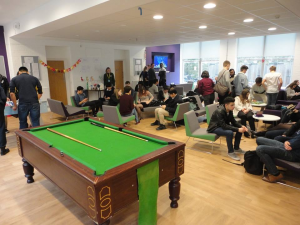Being invited to an interview at Oxford can be both exciting and daunting. While we hope that candidates will look forward to the chance to show us their intellectual potential, the last thing they should have to worry about is logistics – the when and where of the interviews themselves. Fortunately, when they arrive in Oxford they find that there are a multitude of helpers to make them feel at home. We rely heavily on our current undergraduates during the interview period to show candidates around the colleges, take them to their interviews, and generally put them at ease. This week, we hear from fourth-year German student at St Peter’s, Isobel Cavan, who gives us a helper’s perspective:
When I came to Oxford for my interviews, I can remember wishing that my four hour train journey could be just a bit longer so I could somehow re-read all the books I’d mentioned on my personal statement! I was incredibly nervous, but when I got to the college that was hosting me I was met by a really friendly second-year student, who showed me my room, where I could get food, and where all the information about interviews would be posted. He even carried my bag up four flights of stairs! He told me the best thing to do was to try and enjoy the whole process, and although it’s easier said than done, it really is true.
And the college hosting you will really try to help you enjoy it. Each college has a group of current students whose job it is to make you feel welcome, make sure you don’t get lost, and arrange a few fun things to do when you’re not doing your interviews. This might be showing films in the common room, or organising a group of people going for ice cream at G&D’s (the best place in Oxford for ice cream). It can be really helpful to be able to get out of your room and chat to people, most of them doing different subjects, and explore the town whilst you’re here.

Whilst the interviews themselves are never going to be the most relaxing half hour of your life, they’re actually pretty fun once you get into them. And if you have any worries, or just need someone to make you a cup of tea, there should be plenty of people around in the common room who’ll be happy to help. Four years after my own interviews, I’m really looking forward to helping out this year and making sure everyone knows where they’re going. Everyone helping will have been in your shoes not too long ago, and we understand how daunting it can seem. The colleges and tutors are all looking forward to meeting you, and I hope you have a great time at your interviews.

